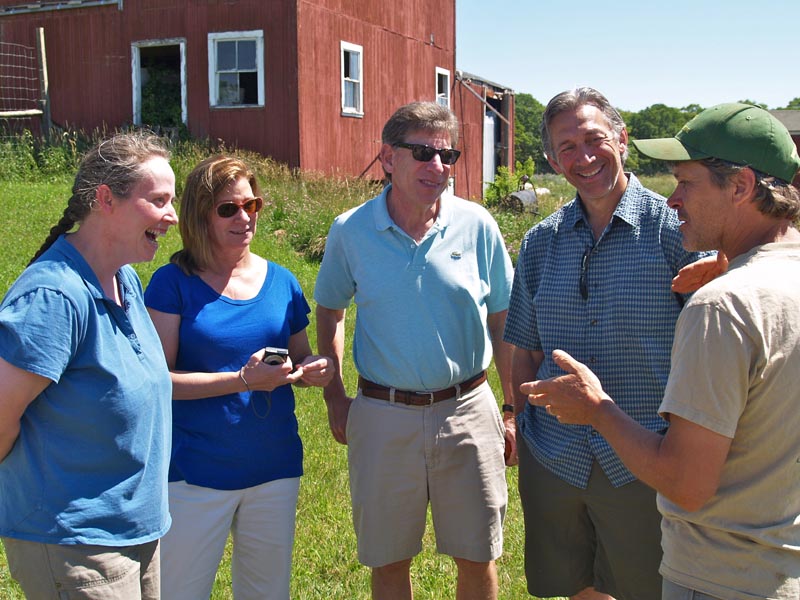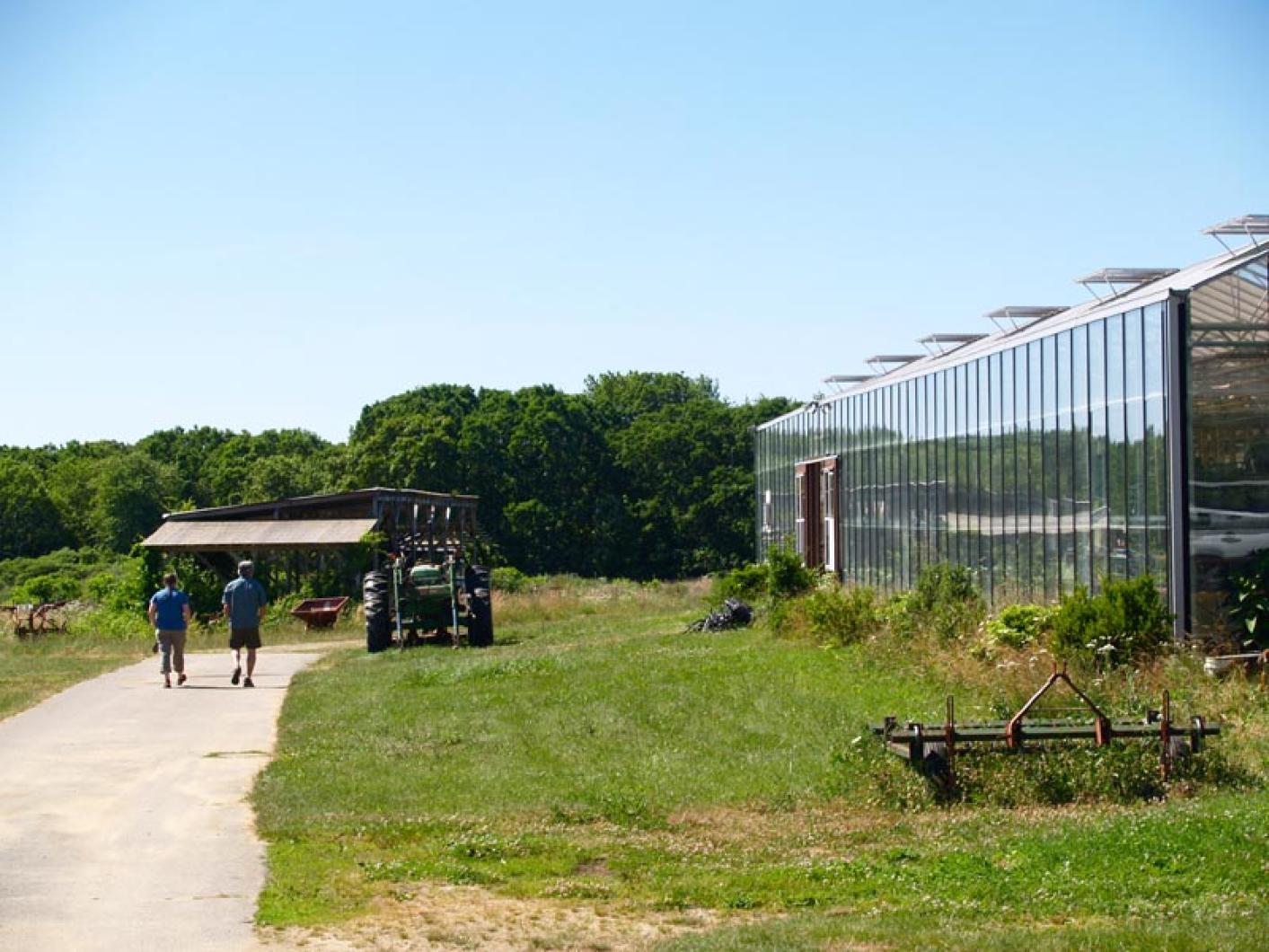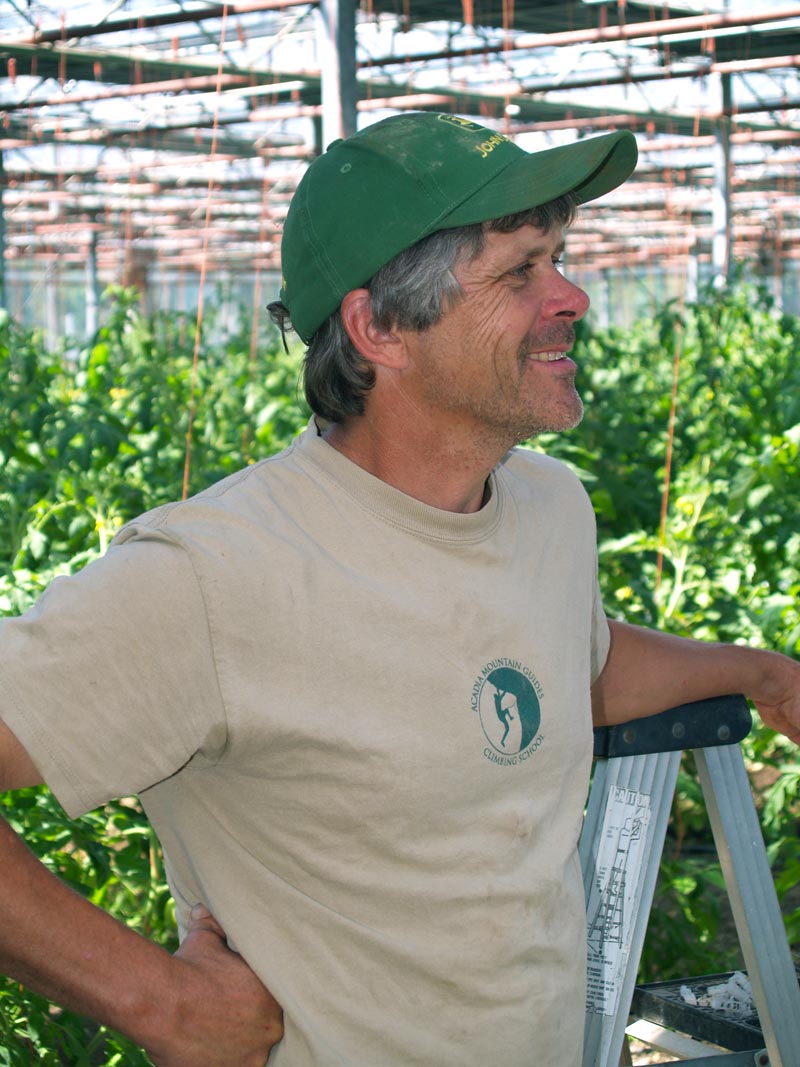Andrew Woodruff emerged from a tangle of tomato vines in the Thimble Farm greenhouse last Sunday morning, carrying the first ripe tomato of the season.
“I don’t know who to give it to,” Mr. Woodruff smiled. Standing in front of him were Sarah McKay, president of the Island Grown Initiative, Eric Grubman, the former owner of the property and Allan and Shelley Holt, who recently donated money to help IGI buy the farm and keep it in active food production for future generations.
Mr. Woodruff placed the red fruit in Mr. Holt’s hand.
“Wow,” Mr. Holt said. “That’s just great.”
The gift of a single ripe tomato signified the changing of the guard at Thimble Farm. Mr. Woodruff, the owner of Whippoorwill Farm, has worked the land here for the past five years.
And now IGI has taken ownership of the 40-acre farm. Significant donations from Mr. Grubman and the Holts made the $2.6 million sale possible.

The Sunday morning walk-through of the property with the Gazette marked the first time that all the principle stakeholders in the venture had been together. And as they walked, they reflected on the history of the property and the discussed the still-emerging vision for what will now be named Island Grown Farms.
Ms. McKay said IGI intends to lease out plots of various sizes on the farm to Island farmers of various interests. Community gardens are planned, including one specifically for Brazilians.
“There are a lot of people out there who have passion and a vision but they need access to land, they need the support,” Ms. McKay said. “We’re interested in looking into different ways of how we can support farmers so they can be successful farmers, make a living, support their families and be a part of the Island community.”
She said the vision for Island Grown Farms is simply an extension of what IGI originally set out to do, which is support and advocacy for sustainable farming on the Island. She recalled the first farmers’ dinner hosted by IGI in 2005, when affordable housing for farm workers and access to land were described as the top concerns among small growers.
“Those were things we had on our list but we weren’t in the position to do much about them in a direct way, and now we have the opportunity to do this and be available to more than one farmer, to a community,” Ms. McKay said.
She said she expects the plan for the farm to come together slowly and with plenty of community participation.
“We’re not going to operate a CSA and compete with Whippoorwill Farm; we’re not going to operate an education farm and compete with the Farm Institute; we’re not going to farm the land ourselves,” she said.
Repairs are needed for the farm buildings and greenhouses. Ms. McKay said a house and one of the barns on the property will likely need to be torn down. And the 33,000-square-foot greenhouse, built by former owners for a hydroponic tomato operation and the largest greenhouse on the Island, needs significant repairs. A consultant hired last fall to evaluate the greenhouse estimated that $250,000 to $300,000 would be needed for repairs and upgrades. Even considering the cost, “they said it was a golden egg,” Ms. McKay said.
Mr. Woodruff has moved the Whippoorwill CSA operation back to his property on Old County Road in West Tisbury, but will continue to grow his organic vegetables at Thimble until the end of the farming season in the fall.
Ms. McKay praised his dedication to the land.
“Somebody like Andrew who’s been farming here on the Island for many, many years, before IGI was even in existence and before everyone was into local food, guys like this are the ones that held on to things to make sure there was something for us to have when the time came,” she said. “It was kind of the dark ages for local food production.”
Mr. Woodruff returned the compliment.
“Go back five or six years, there was minimal interest in local food and local agriculture. It was there but it wasn’t like this and IGI’s been a big part of it,” he said.
IGI will spend the fall and winter months developing a business plan for the farm. The fields will be planted with cover crops, and some of the land may be used for grazing livestock, Ms. McKay said.
Meanwhile Mr. Grubman, a seasonal resident of Edgartown who has a farm in New Jersey, had some quiet words of advice for the fledgling owners. “If there’s one thing I’ve learned from Andrew and from my own fussing around with my own farm, it is the unpredictable nature of the business,” he said. “The economics are really hard, there’s a new challenge every day and it’s not the one you anticipated. Everything has to be operated to carry itself. The Island is a place where farms can’t afford land, and if you can’t afford land you can’t afford equipment.” He praised the Holts for their contributions which he said would break that “vicious cycle.”
Mr. Woodruff added words of encouragement. “I think over time, there will be ups and downs and challenges, but over time something will settle onto this property that will make sense and will work for the long term,” he said.
Mr. Grubman continued the theme. “Whoever you get to be involved in the project, make sure they’re in it for the long term because it doesn’t happen by itself and it’s not going to be easy,” he said.
“Then you have the famous farmer, Winston Churchill — never give up, never give up, never give up. I don’t think he ever farmed but that was his speech,” he laughed.
The Holts, who were visiting the farm for the first time, said it reinforced their resolve.
“I think we are all committed to supporting IGI and helping in anyway we can,” he said. “We really feel a commitment to supporting it. We helped buy the land and if it doesn’t turn into a farm that supports lots of farmers and families and a good product, then in effect we would have failed too.”
As Mr. Grubman left, Mr. Woodruff got back on his tractor, and the Holts walked to the back of greenhouse and looked over the large field of crops growing taller by the minute in the warm June sunshine.
“It’s a special piece of property,” Mr. Holt said. “Now that I’m here and seeing it, it’s really a wonderful place.”










Comments
Comment policy »